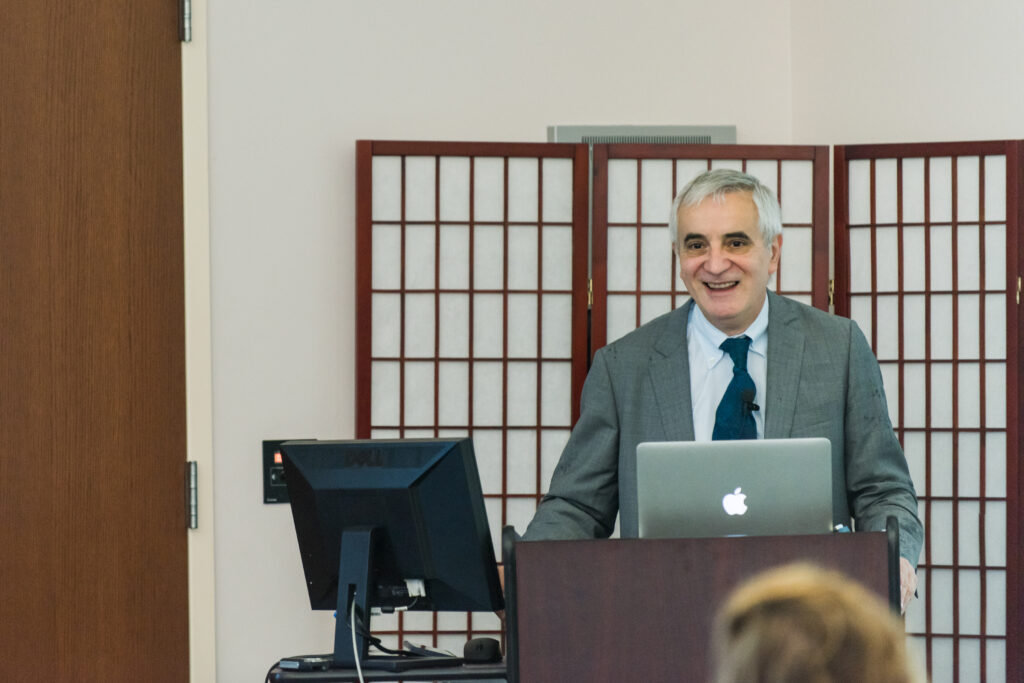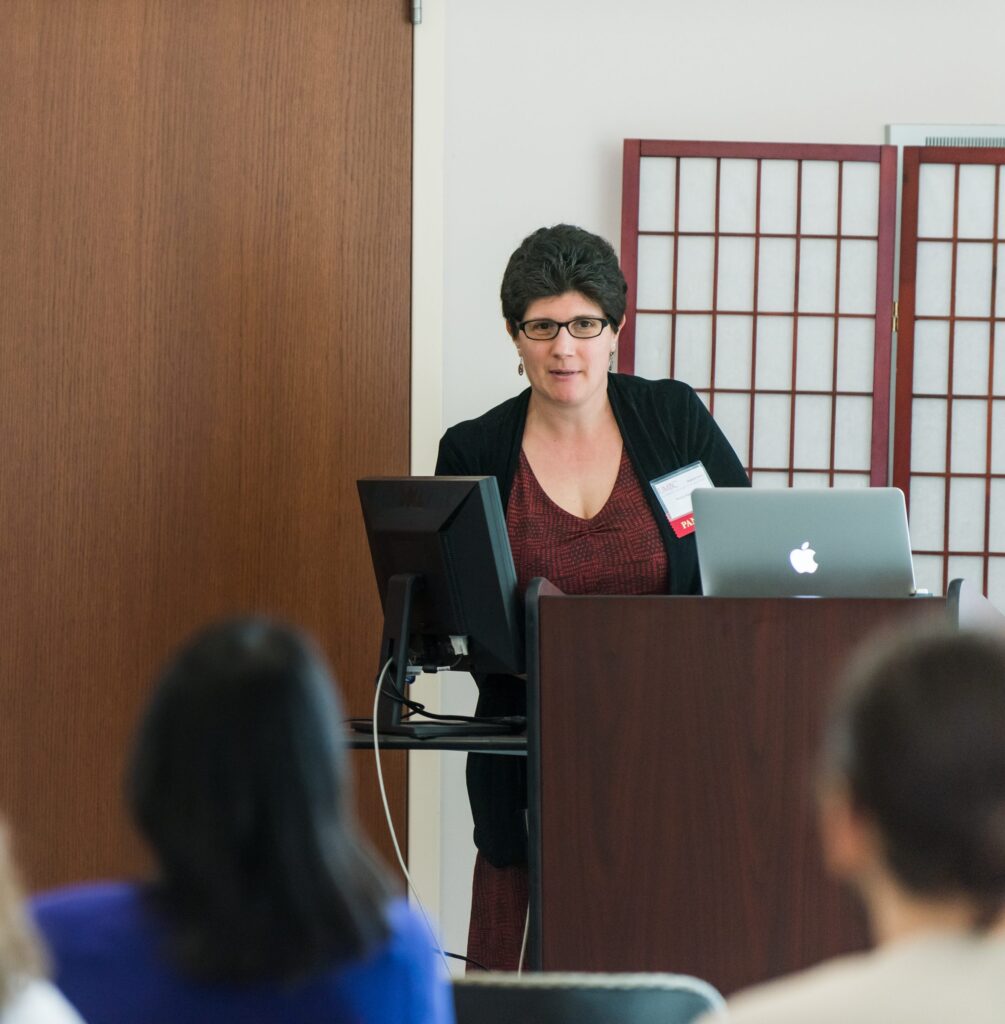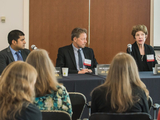UMBC Forum on Aging Research
Highlighting the need for interdisciplinary collaborations
This article was originally written here and written by Sarah Hansen.
The spring 2017 UMBC Research Forum focused on innovative research in aging and the life course—a notably far-reaching area of study that transcends a diverse range of fields. Speakers discussed aging research from the microscopic scale of genetic mutation to analysis of federal policy, and all emphasized the importance of interdisciplinary collaboration in this complex area of study.
“Health, we know, is not cardiovascular, is not neurological, is not pathological. Those are completely artificial distinctions,” shared keynote speaker Luigi Ferrucci, director of science at the National Institute on Aging. “It’s become very, very clear that everything interconnects.”
Ferrucci focused his remarks on the complex relationship between nutrition and aging. “We know intuitively that nutrition affects the aging process dramatically, but it’s also an understudied area,” he said. For example, strict caloric restriction, which has resulted in lifespan extension across many species in scientific studies, seems to have a more nuanced effect on human health and lifespan.
 Luigi Ferrucci, director of science at the National Institute on Aging, gives his keynote at the 2017 Research Forum.
Luigi Ferrucci, director of science at the National Institute on Aging, gives his keynote at the 2017 Research Forum.Ferrucci also stressed the importance of analyzing how the body processes food after ingestion. His research suggests that people don’t absorb amino acids, the building blocks of muscles, into their muscles as well as they age. Also, age-related changes in mitochondria, which release energy for use by cells, result in reduced muscular strength.
“Nutrition cannot be resolved in terms of what you put in your stomach, but what happens to those molecules when they come into your body,” Ferrucci said. “Only by putting together the biology of aging will a nutritional intervention really be able to make a difference.”
It’s these connections across fields of research that have so much potential to reveal new insights in aging, said Karl Steiner, vice president for research, affirming that we “need to shine the light on these complex issues.”
John Schumacher, associate professor of sociology, anthropology, and health administration policy, kicked off the first panel by addressing his research on geriatric emergency departments. These senior-focused facilities have been popping up around the country over the last decade, but they can be quite different from one another, and much can still be done to improve the experiences of seniors who visit emergency departments, Schumacher said.
Sarah Chard, associate professor of anthropology, discussed her research on the subjective experiences of people with diabetes. She explained how doctors may label patients as “non-compliant” when they do not follow medical guidance, without recognizing “the presence of patients’ competing, yet very rational, health goals.” For example, if a person who would benefit from exercise is wary of leaving home, it would be more beneficial for a doctor to suggest at-home exercise options than to insist the patient walk or drive to an exercise facility. Chard explains, “Greater attention to the social dimensions of disease management is critically needed.”

Nancy Kusmaul, social work, discusses her research on how nursing home policies affect employees.
Nancy Kusmaul, assistant professor of social work, talked about how some nursing homes are making systemic changes to give residents more autonomy, such as offering meals across wider time windows. However, institutions often make changes without considering the impact on employees, many of whom are living at or below the poverty line despite working full time. “How can staff care for residents when they’re not being cared for themselves by the organization?” Kusmaul asked.
In the second panel, Ravi Kuber, associate professor of human-centered computing, spoke about his work developing a tool that helps people maintain pace while walking. It provides cues in the form of vibrations at the hip, leaving eyes and ears available to take in the environment. Kuber’s research team is also learning more about how seniors interact with technology, such as tablets, with the goal of providing guidelines to interface developers.
Jeff Leips, professor of biological sciences, studies how aging affects traits in fruit flies. At the forum, he discussed work that looks at the immune response, lifespan, and endurance. Genes are highly conserved across flies and humans, making them an excellent study organism. One surprising finding from the lab has been that genes do not affect traits in the same way across the lifespan, Leips says. That might mean treatment for the same disease should look different depending on a patient’s age.
Nancy Miller, professor of public policy, talked about her research on the distribution of funding for long-term care services between institutional environments and home- and community-based care. She found that public funding for the latter increased following policy changes, especially in states that initially provided the least funding for these services. That suggests, she says, “there’s a continued role for policies to encourage states in this direction.”
In closing the event, President Freeman Hrabowski focused on the fact that those who are privileged tend to age more gracefully than those who are not, and that that inequality needs to change. Moving forward, he told the participating researchers, “the work that you do, and the research, the training, will be increasingly important for all of us.”
Banner image: Ravi Kuber, information systems; Jeff Leips, biological sciences; and Nancy Miller, public policy, take questions after giving short talks on their research. All photos by Marlayna Demond ’11 for UMBC.
Posted: June 6, 2017, 3:32 PM
